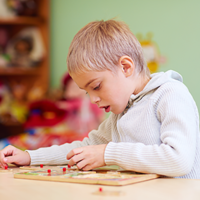externalising personality traits
-

The role of sleep in prospective associations between parent reported youth screen media activity and behavioral health
Paper from the CAMH journal – ‘We examined whether sleep mediated the association between screen media activity and youth behavioral health among a community sample’. Darlynn M. Rojo-Wissar (pic) et al.
Read more -

Development of morning–eveningness in adolescence: implications for brain development and psychopathology
Open Access paper from the JCPP – “Here, we investigated the longitudinal relationships among the trajectory of eveningness preference, internalizing and externalizing psychopathology and white matter development, across adolescence”. Rebecca Cooper et al.
Read more -

Is frontoamygdalar connectivity in the resting brain linked with externalising behaviours during development?
Externalising problems tend to vary over the course of development, but often peak in late adolescence. Data suggest that the frontoamygdalar brain circuitry (involved in emotion regulation) might have an important role in mediating externalising behaviour.
Read more -

Can childcare attendance reduce externalising behaviour in children exposed to adversity?
Childcare attendance has been proposed as a public health initiative to help close the developmental gap between children from disadvantaged families and their wealthier peers.1,2 Now, Marie-Pier Larose and colleagues have investigated whether childcare attendance might modify the association between exposure to family adversity early in life and later externalising behaviour by buffering cognitive function.
Read more -

Cognitive inflexibility contributes to both externalising and internalising difficulties in ASD
Children with autism spectrum disorder (ASD) commonly experience internalising and externalising symptoms, but the underlying cognitive mechanisms are unclear. In their latest study published in the Journal of Child Psychology and Psychiatry, Ann Ozsivadjian and colleagues examined the role of three cognitive factors that might contribute to these difficulties.
Read more -

Is infant empathy linked with later externalizing problems?
Until recently, it has been assumed that young infants cannot feel empathy for others.1 However, emerging data suggest that this might not actually be the case.2 Now, Yael Paz and colleagues have examined empathy development during the first years of life, analysing data from 165 infants involved in a longitudinal, prospective study.
Read more -

Poor sleep quality in adolescence might contribute to poor psychological functioning
Sleep problems affect up to 25% adolescents and have frequently been associated with psychopathology. Now, Marije Vermeulen and colleagues have investigated whether short and/or problematic sleep truly contributes to psychological functioning.
Read more